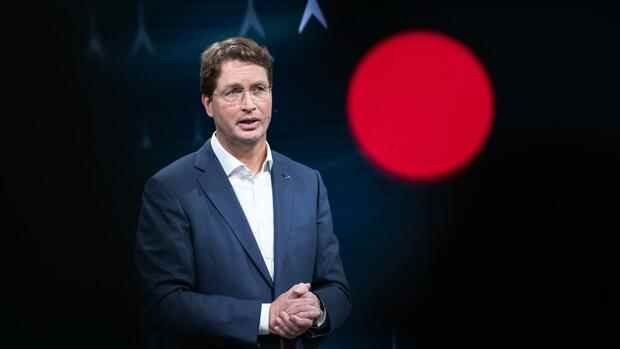On Tuesday, at the World Climate Conference in Glasgow, Källenius signed a declaration by several countries and companies on emission-free vehicles by 2035.
(Photo: dpa)
Munich “Electric only”, everything under power: That is the clear direction of Ola Källenius. The Daimler boss wants to increase the proportion of purely electric cars in the Group’s new vehicle fleet from the current four to one hundred percent by 2030. When switching from conventional to alternative drives, the Swede relies on the principle: “Faster is better”, as he put on record at the Handelsblatt Auto Summit on Wednesday.
On Tuesday, at the World Climate Conference in Glasgow, Scotland, Källenius signed a declaration by several states and companies that only zero-emission new cars would be offered in leading markets by 2035. At the same time, the 52-year-old does not see the diesel and gasoline business as a legacy. “Burners are not a bad bank,” explained Källenius.
This would only be the case if, in the course of converting the range of models, an “enormous residual depreciation” would suddenly arise for conventional units. “But we don’t see that from a pure cash flow point of view,” said Källenius. Rather, his company is “very lucky” to have just completely renewed its range of combustion engines.
That means: Daimler hardly has to invest any money in the established technology. “Several years later we will still make positive contribution margins from this investment,” said Källenius. Ultimately, the transition to purely electric drives will be gradual and not abrupt.
Top jobs of the day
Find the best jobs now and
be notified by email.
As long as there is no omnipresent charging infrastructure, it is “absolutely sensible” to continue promoting the controversial plug-in hybrids, explained the Mercedes manager. In the next four or five years these will definitely still be “part of the solution”.
At the same time, Källenius is setting a clear end date for the technology: “We will phase out the plug-in hybrid at the end of the decade.” The Scandinavian does not want to split Mercedes’ development expenses into several drive variants for too long, but is clearly focusing on pure electric vehicles.
Declaration of war on Tesla
Unlike rival Volvo and its parent company Geely, Mercedes-Benz does not want to outsource its internal combustion engine business to its own company. “We only do rational things that also bring something,” said Källenius. The group will also be converting its production portfolio step by step.
One thing is already clear: the main plant in Stuttgart-Untertürkheim will be converted into a green campus. The development and production of transmissions for compact vehicles will also be carried out by the supplier Magna for Daimler in the future; in-house assembly will be discontinued from the middle of the decade. At the same time, Mercedes-Benz is investing in the ACC consortium in setting up several battery cell factories around the globe.
Investors prefer pure electric car brands to established corporations. Tesla alone is currently trading for more than a trillion dollars on the stock exchange – a good ten times as much as Daimler. Källenius hopes to be able to reduce the discrepancy in market capitalization somewhat with the spin-off of the truck division in December.
But it is “unrealistic” for an established industrial company like Daimler to soon be rated with a multiple of 50.60 or even 100. Nevertheless, the Scandinavian still sees room for improvement. At six to seven, Daimler’s price-earnings ratio is currently clearly too low. More is possible through the combination of luxury and tech. “There’s something in there,” said Källenius.
The fact that Tesla is worth more than a trillion dollars alone can be described as “good news”, stated the Mercedes manager. Because that shows that the financial market basically believes in the future of car companies and sees a lot of potential here. In the face of Tesla, Källenius was finally combative: “In the next ten years we will have to work on a redistribution of this market capitalization,” said the Daimler boss. “That will be our job.”
More: “This is too short a thought”: BMW boss rejects premature combustion bans
